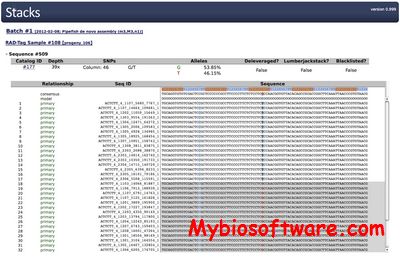Stacks 2.59
:: DESCRIPTION
Stacks is a software pipeline for building loci out of a set of short-read sequenced samples. Stacks was developed for the purpose of building genetic maps from RAD-Tag Illumina sequence data, but can also be readily applied to population studies, and phylogeography.
DEVELOPER
:: SCREENSHOTS
:: REQUIREMENTS
- Linux / MacOsX
- MySQL
- Perl
- MDB2 Pear Module
:: DOWNLOAD
:: MORE INFORMATION
Citation:
J. Catchen, A. Amores, P. Hohenlohe, W. Cresko, and J. Postlethwait.
Stacks: building and genotyping loci de novo from short-read sequences.
G3: Genes, Genomes, Genetics, 1:171-182, 2011
